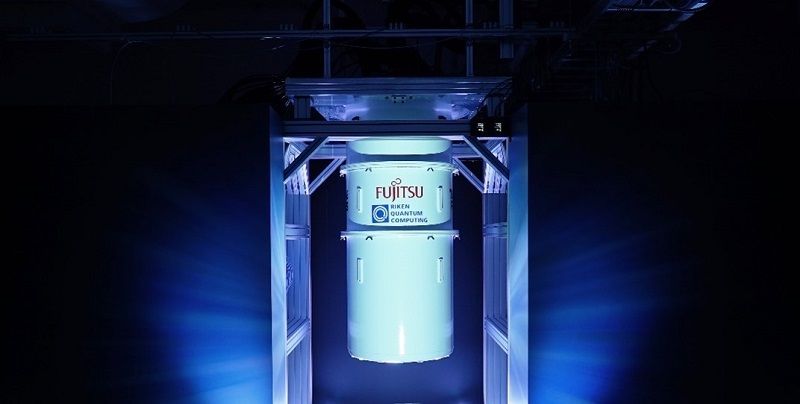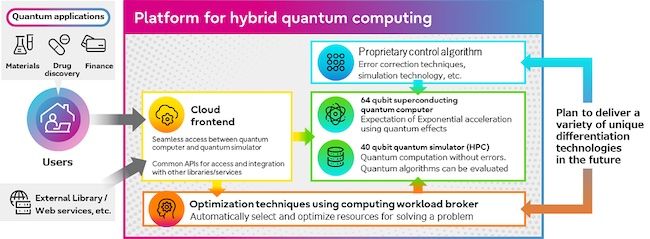TOKYO, Oct 5, 2023 - (JCN Newswire) - Fujitsu and RIKEN today announced the successful development of a new 64 qubit superconducting quantum computer at the RIKEN RQC-Fujitsu Collaboration Center. The new quantum computer leverages the technology developed by RIKEN and a consortium of joint research partners including Fujitsu for Japan’s first superconducting quantum computer, which was first revealed to the public in March 2023.
Accompanying this announcement, Fujitsu and RIKEN further revealed the launch of a platform for hybrid quantum computing, which combines the computing power of the newly developed 64 qubit superconducting quantum computer with one of the world's largest (1) 40 qubit quantum computer simulators developed by Fujitsu. Fujitsu and RIKEN will provide the new platform to companies and research institutions that are conducting joint research with Fujitsu and RIKEN from October 5, 2023.
 Quantum computer developed at the RIKEN RQC-Fujitsu Collaboration Center
Quantum computer developed at the RIKEN RQC-Fujitsu Collaboration Center
The new hybrid platform enables easy comparison of calculation results of noisy intermediate-scale quantum (NISQ) computers against error-free results from quantum simulators, contributing to accelerated research in areas including performance evaluation of error mitigation algorithms in quantum applications.
Fujitsu and RIKEN are further developing a hybrid quantum algorithm that links superconducting quantum computing with high-performance computing (HPC). By linking a quantum computer with a quantum simulator that runs on an HPC, Fujitsu and RIKEN have succeeded in developing a hybrid quantum algorithm that enables quantum chemistry calculations with greater accuracy than conventional algorithms (CCSD(T)) (2). The two partners plan to include this algorithm in the new platform.
Moving forward, Fujitsu and RIKEN will promote the development of technologies including high-density implementation to realize a 1,000 qubit superconducting quantum computer, as well as technologies to achieve more precise quantum gate operations.
Fujitsu and RIKEN will further provide quantum computing and quantum simulation resources to customers for applications in various fields including finance and drug discovery through this platform and promote R&D activities for quantum applications through joint research to accelerate the practical application of both quantum computing hardware and software.
Leading the way to the age of practical quantum computing
The development of various quantum computing architectures has been progressing at high speed in recent years. The creation of reliable computing results with quantum computers, however, represents an ongoing challenge, as current NISQ systems are still suffering from computing errors due to noise in the surrounding environment.
Experts anticipate that the realization of a practical fault-tolerant quantum computer (FTQC) that can provide reliable, accurate results, will take a decade or longer. In addition, the simultaneous development of quantum applications to realize the practical use of quantum computers once a FTQC is available represents another priority.
Quantum simulators, which can digitally imitate quantum computation, provide a vital bridge toward the development of practical, fault-tolerant quantum computing. Unlike current quantum computers, quantum simulators can perform error-free and long-step (quantum-like) computations as they do not rely on error-prone qubits. However, as quantum simulators only digitally reproduce quantum computation on classical computers, they cannot realize actual quantum acceleration, an expected benefit of practical quantum computers.
To address these issues, Fujitsu and RIKEN have launched a new hybrid quantum computing platform that combines the advantages of superconducting quantum computers and quantum simulators, ultimately contributing to further usage of the superconducting quantum computer developed at the RIKEN RQC-Fujitsu Collaboration Center and the development of new quantum applications.
About the new 64 qubit superconducting quantum computer developed at the RIKEN RQC-Fujitsu Collaboration Center
The new 64 qubit superconducting quantum computer utilized in the new hybrid quantum computing platform leverages the technology of Japan’s first superconducting quantum computer announced by RIKEN in March 2023 as part of the Japanese Ministry of Education, Culture, Sports, Science and Technology’s Quantum Leap Flagship Program (MEXT Q-LEAP) (Team Leader: Yasunobu Nakamura; Grant No. JPMXS 0118068682), and has been developed at the RIKEN RQC-Fujitsu Collaboration Center in cooperation with Nippon Telegraph and Telephone Corporation (NTT) (3). The computer includes an integrated 64 superconducting qubit chip (a central element for the computing functions of quantum computers) and uses a vertical wiring scheme similar to that of RIKEN’s quantum computer, making it scalable for future expansion. It further leverages qubit control software built by NTT to achieve high-precision control of qubits. The new superconducting quantum computer enables calculations of ideally up to 2 64 quantum superposition and entanglement states, which is expected to enable calculations on a scale that have been difficult to achieve with classical computers.
R&D of hybrid quantum algorithms
Fujitsu and RIKEN are further developing hybrid quantum algorithms that link quantum computing and HPC to contribute to the solution of problems in various industries. As part of their current joint research, the two parties have developed a hybrid quantum algorithm in which a quantum simulator performs part of the calculation of an algorithm for a quantum computer. The algorithm enables the calculation of large molecules with high accuracy using quantum algorithms and Density Matrix Embedding Theory (DMET), a quantum chemistry calculation method to divide large molecules into multiple small fragments. Fujitsu and RIKEN applied this algorithm to the calculation of the ground state energy of the H12 molecule (a chain molecule consisting of twelve hydrogen atoms) and combined it with AI-based quantum computation correction technology to mitigate the effects of noise in quantum computers. In this way, Fujitsu and RIKEN for the first time confirmed that energy calculations can be performed with higher accuracy than existing classical algorithms (CCSD(T)). In addition to providing this technology on the new hybrid quantum computing platform in the future, Fujitsu will further work toward the realization of a computing workload broker, an AI-based software that automatically selects from different computing resources and algorithms to offer the optimal solution to customers’ problems.
About the new hybrid quantum computing platform
The new platform is implemented as a scalable cloud architecture by utilizing cloud services such as serverless computing service AWS Lambda provided by Amazon Web Services (4). It offers companies and research institutions collaborating with Fujitsu and RIKEN a seamless access environment for both the quantum computer and quantum simulator via common APIs.
The two parties anticipate that the new platform will enable flexible switching between quantum computing and quantum simulation necessary for the development of hybrid algorithms that use both classical and quantum computers, such as the Variational Quantum Eigensolver (VQE) algorithm for molecular energy calculation in quantum chemistry or quantum machine learning algorithms in finance. Fujitsu and RIKEN further expect that the new platform can be linked to external quantum chemistry calculation libraries in the future.
 Overview of the new platform for hybrid quantum computingFuture Plans
Overview of the new platform for hybrid quantum computingFuture Plans
Moving forward, Fujitsu and RIKEN will continue joint development at the RIKEN RQC-Fujitsu Collaboration Center toward the realization of a large-scale quantum computer with 1,000 qubits and will provide the jointly developed technologies via the new hybrid quantum platform.
RIKEN and Fujitsu will strengthen their cooperation in the development of practical applications for quantum computers, and promote R&D of quantum computing simulation technology and software technology that orchestrates quantum computing with HPC.
Fujitsu has been conducting joint research with Fujifilm Corporation (5), Tokyo Electron Limited (6), Mizuho DI Financial Technology Co., Ltd. (7) and Mitsubishi Chemical Group Corporation (8) on the development of pioneering quantum applications using quantum simulators.
Moving forward, Fujitsu in cooperation with RIKEN aims to accelerate joint research using the new hybrid platform with various companies, universities and research institutes, and expand the search for practical hybrid quantum applications in various fields including materials, finance, and drug discovery.
Comments from joint research partners of FujitsuComment from Yukihiro Okuno, Senior Research Scientist, Analysis Technology Center, Fujifilm Corporation:
“We anticipate that the ultrafast computing power of quantum computers enables unprecedented high-precision chemical calculations, which will greatly contribute to materials development. Fujifilm will leverage the new hybrid quantum computing platform to research the effects of noise on current quantum computing results. We will also continue to develop innovative materials through the application of quantum computing.”
Comment from Tsuyoshi Moriya, Vice President, Digital Design Center, Tokyo Electron Limited:
“In the field of computational chemistry, quantum computers have the potential to perform highly accurate calculations that have not been possible with classical computers. Tokyo Electron is conducting this joint research as part of a feasibility study to utilize quantum computers for semiconductor manufacturing process development and material development.”
Comment from Kazuya Kaneko, Financial Engineer, Mizuho-DL Financial Technology Co., Ltd.:
“Quantum circuit devices and large-scale quantum circuit simulators are essential in research for performance evaluation and demonstration of quantum applications and error correction algorithms. Through this joint research, we aim to establish foundational technologies for applications in the fields of financial engineering and data science, with the ultimate goal of implementing quantum computing in society.”
Comment from Qi Gao, Senior Chief Scientist, Materials Design Laboratory, Science & Innovation Center, Mitsubishi Chemical Group Corporation:
“The conventional approach for the discovery of new materials and new drugs is extremely costly and time-consuming. To accelerate cycles of the scientific discovery, we are promoting a new R&D system that enables to yield rapid and accurate property predictions by utilizing quantum computers. As part of this effort, we are conducting joint research with Fujitsu, aiming to combine large-scale quantum computing with other emerging technologies in the future to create innovations in the fields of materials and drugs discovery.”
[1] World’s largest :World's largest permanent dedicated quantum simulator of state vector method (as of September 2023, according to Fujitsu)
[2] CCSD(T) :Coupled Cluster Single, Double, (and Triple), a computational method known as high-precision computing in quantum chemistry calculations.
[3] Nippon Telegraph and Telephone Corporation (NTT) :Headquarters: Chiyoda-ku, Tokyo, Japan; President: Akira Shimada
[4] Amazon Web Services (AWS) :Global cloud computing service which Amazon Web Services has been offering since 2006
[5] Fujifilm Corporation :Headquarters: Minato-ku, Tokyo, Japan; President and CEO: Teiichi Goto
[6] Tokyo Electron Limited :Headquarters: Minato-ku, Tokyo, Japan; Representative Director, President & CEO: Toshiki Kawai
[7] Mizuho DI Financial Technology Co., Ltd. :Headquarters: Minato-ku, Tokyo, Japan; President and CEO Takahiko Yasuhara
[8] Mitsubishi Chemical Group Corporation :Headquarters: Chiyoda-ku, Tokyo, Japan; President and CEO: Jean-Marc Gilson
About Fujitsu
Fujitsu’s purpose is to make the world more sustainable by building trust in society through innovation. As the digital transformation partner of choice for customers in over 100 countries, our 124,000 employees work to resolve some of the greatest challenges facing humanity. Our range of services and solutions draw on five key technologies: Computing, Networks, AI, Data & Security, and Converging Technologies, which we bring together to deliver sustainability transformation. Fujitsu Limited (TSE:6702) reported consolidated revenues of 3.7 trillion yen (US$28 billion) for the fiscal year ended March 31, 2023 and remains the top digital services company in Japan by market share. Find out more: www.fujitsu.com.
About RIKEN
RIKEN is Japan's largest research institute for basic and applied research. Over 2500 papers by RIKEN researchers are published every year in leading scientific and technology journals covering a broad spectrum of disciplines including physics, chemistry, biology, engineering, and medical science. RIKEN's research environment and strong emphasis on interdisciplinary collaboration and globalization has earned a worldwide reputation for scientific excellence. Website: www.riken.jp/en/Facebook: www.facebook.com/RIKENHQTwitter: @riken_en
Press Contacts:
Fujitsu Limited
Public and Investor Relations Division
Inquiries
RIKEN
RIKEN Global Communications
Tel: +81-(0)48-462-1225
E-mail: pr@riken.jp